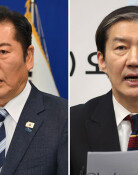[Opinion] Lee Administration Teetering on Collapse
[Opinion] Lee Administration Teetering on Collapse
Posted August. 04, 2008 03:09,
The floor leader of the ruling Grand National Party, Hong Joon-pyo, took office at the end of May amid mixed expectations. Some cited his strong character built from his experience as a public prosecutor and a lawmaker, while others complained of his contradictory remarks. No wonder some hoped him to be the one to find a breakthrough in the U.S. beef controversy, though others worried that he could make matters worse by inviting unnecessary conflict with opposition parties or the government. Unfortunately, his two-month performance has proven the pessimists right. Instead of healing the rift in the National Assembly, he has caused a crack within his own party.
Seeking to invite the main opposition Democratic Party back to the National Assembly, Hong dropped all charges against its presidential candidates and even agreed to a national investigation on U.S. beef imports. To get parliament back on track, he removed the producers of the controversial TV magazine PD Notebook from the list of witnesses to a U.S. beef hearing and conceded the parliamentary judiciary committee chairmanship, a position central to National Assembly management, to the opposition party. Hong received nothing in return, however. It is no surprise that he was condemned by the government and his party. The most devastating blow came when he used the presidential office as an excuse to reject the oppositions request for a special committee on ministerial appointments at the last minute.
In a floor meeting at the end of last month, Hong made the presidential office uneasy by saying, I dont understand why there was a transition in power. At this pace, the nation will fall into a state of anarchy. Now he says, I have done nothing wrong but simply my job as the ruling partys floor leader. Hong alone did not put the presidential office in an awkward position. Ruling party chairman Park Hee-tae suddenly brought up sending a special envoy to North Korea, only to be turned down by President Lee Myung-bak the next day. Lim Tae-hee, the chairman of the partys policy-making committee, also created confusion over privatization of state-run enterprises, though it was later cleared up.
The presidential office and the ruling party form the two pillars of the Lee administration. Their lack of communication, however, shows how useless their dialogue channel is. The reason for this is simple; they are not committed to their critical obligations vis-à-vis transition of power. They seem to forget why voters supported them. If they were only committed to their voters, they would not be at the opposition partys nod even with a parliamentary majority or fight among themselves. All in all, the past six months have proved to be an utter disappointment to the nation.
Editorial Writer Lee Jin-nyong (jinnyong@donga.com)



![[단독]이혜훈 “장남 다자녀로 연대 입학”…당시 그런 전형 없었다](https://dimg.donga.com/c/138/175/90/1/wps/NEWS/IMAGE/2026/01/23/133215083.1.jpg)
![하버드 의사가 실천하는 ‘뇌 노화 늦추는 6가지 습관’ [노화설계]](https://dimg.donga.com/c/138/175/90/1/wps/NEWS/IMAGE/2026/01/22/133210626.3.jpg)

![[단독]“5000만원씩 두 상자…윤영호 ‘王자 노리개 상자’ 권성동에 건네”](https://dimg.donga.com/c/138/175/90/1/wps/NEWS/IMAGE/2026/01/23/133215085.1.jpg)
